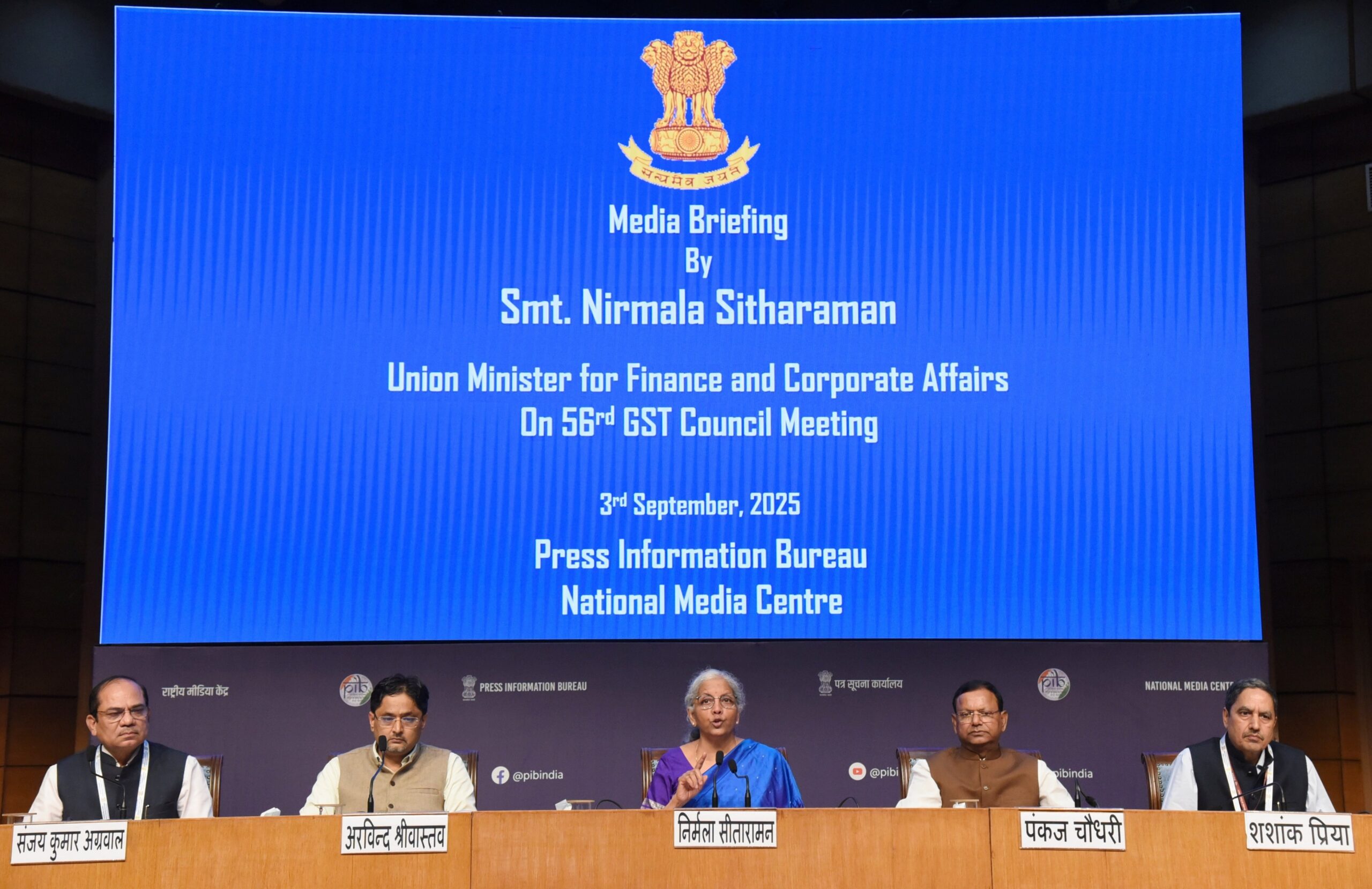- January 12, 2026
- Updated 11:31 am
Tax axe of cancer drugs
- obw
- September 13, 2025
- Latest News
Strap: Midweek GST Council move brings relief, slashing levies on 33 cancer and rare disease medicines
OB Bureau
In a major relief for patients battling cancer and rare diseases, the Union government midweek slashed Goods and Services Tax (GST) on 33 life-saving medicines from 12% to zero.
The decision was taken at the GST Council meeting chaired by Finance Minister Nirmala Sitharaman, which also approved a broad rationalisation of the indirect tax regime.
The four existing slabs have now been pruned to two, with the 12% and 28% brackets scrapped, while the 5% and 18% slabs will remain.
“GST on 33 life-saving drugs and medicines has come down from 12% to zero,” Sitharaman said, adding that several other medicines and health-related products will see their rates reduced as well.
According to the revised structure, some drugs and devices used in the treatment of cancer, rare diseases, and chronic conditions will move from 12% or 18% to 5% or nil.
“There are several drugs and medicines coming down to 5% from 12%. Similarly, spectacles and goggles for correcting vision are also coming down to 5% from 28%,” she said.
The changes in GST rates on services will come into effect from September 22. Health insurance and life insurance premiums, currently taxed at 18%, will now attract no GST. Medical oxygen, diagnostic kits, and a range of medical and surgical apparatus will also see significant rate cuts—from 18%to 5% in many cases.
However, products deemed harmful to health, including pan masala, gutkha, cigarettes, chewing tobacco and bidi, will continue under high GST rates and compensation cess until outstanding cess-linked loans are cleared.
Aerated sugary beverages, meanwhile, will attract a higher GST rate of 40%, up from the current 28%.
HL: Dharmasthala case: Mask man’s SIT custody ends today
Strap: Several media reports allege Chinnaiah admitted outside influence pushed him to press false allegations deliberately
OB Bureau
The extended custody of complainant Chinnaiah, popularly known as the “mask man,” ends today in connection with the alleged, high-profile Dharmasthala mass murders case.
Chinnaiah was last produced before the Belthangady jurisdictional court midweek, when the Special Investigation Team (SIT) sought 10 more days of custody.
Judge T.H. Vijendra, however, granted only a three-day extension and directed that he be produced again today. The proceedings were held in-camera, with the public barred from attending. Two counsels from the Legal Services Authority had argued in his defence.
The SIT has maintained that additional custody is needed to take Chinnaiah to Mandya, Salem, and New Delhi for further investigation.
The team has already conducted searches in Dharmasthala, Ujire, Belthangady, and Bangalore and is preparing to question activists Mahesh Shetty Thimarodi, Girish Mattennavar, T. Jayanth, and YouTuber Sameer, who have openly criticised the temple administration and Dharmadhikari.
Chinnaiah was arrested after SIT officials concluded that he had misled investigators with false information. On July 11, he claimed he was forced to bury the bodies of women and girls who were raped and murdered in Dharmasthala.
He demanded that the remains be exhumed in his presence and even produced a skull he claimed to have recovered from one of the sites. His allegations prompted large-scale excavations at 17 locations in and around the temple town, though no conclusive evidence has been found. Samples collected are currently undergoing forensic and DNA analysis.
Meanwhile, the SIT is continuing to interrogate Sujata Bhat, another complainant who initially alleged that her daughter, an MBBS student named Ananya, had gone missing under mysterious circumstances. She later withdrew the claim, saying she had no daughter and was blackmailed into making the allegation.
Chinnaiah was initially given protection under the Witness Protection Act, but officials confirmed that the cover has since been withdrawn. Several media reports suggest that he has admitted to being influenced by certain individuals to press false allegations and divert the probe in a particular direction.
Home Minister G. Parameshwara has said that due to soil conditions at the alleged burial sites, human bones may have dissolved. He added that the next phase of the investigation will be guided by laboratory findings once the forensic reports are submitted.
It’s official! Booker winner to flag off Mysuru Dussehra
OB Bureau
Booker Prize-winning author Banu Mushtaq has been formally invited to inaugurate this year’s Mysuru Dussehra, even as controversy continues to swirl around the Karnataka government’s choice.
A delegation led by Mysuru Deputy Commissioner Laxmikanth Reddy visited Mushtaq’s home in Hassan’s Ameer Mohalla midweek and handed over the official invitation. She was honoured with a traditional Mysuru Peta, shawl, bouquet and memento. In return, Mushtaq gifted a signed copy of her award-winning book Heart Lamp. She will formally open the celebrations atop Chamundi Hills on September 22.
Speaking to the press, Reddy said the invitation was extended as per Chief Minister Siddaramaiah’s directive. “Banu Mushtaq has kindly agreed to inaugurate this historic festival,” he said.
Mushtaq, thanking the government, said, “Dussehra is celebrated in every household. It truly belongs to the people of this land.”
The decision, however, has triggered a fierce backlash from the BJP. Former Deputy Chief Minister C.N. Ashwath Narayan alleged that Mushtaq “does not respect Goddess Chamundeshwari” and accused the government of “deliberately creating controversy”.
Party leaders further claimed that the omission of Deepa Bhasti, translator of Heart Lamp, was a slight based on religion.
Congress leaders countered strongly. MLA Kadaluru Uday said, “Why not Banu Mushtaq? She is from Karnataka. BJP is trying to inject caste and religion into every issue.”
The Mysuru Dussehra, regarded as Karnataka’s grandest cultural event, has frequently seen politics play out over the choice of inaugurators.
This year’s row underlines how the 10-day festival, deeply tied to tradition and identity, continues to be a stage for political sparring as much as cultural pride.

